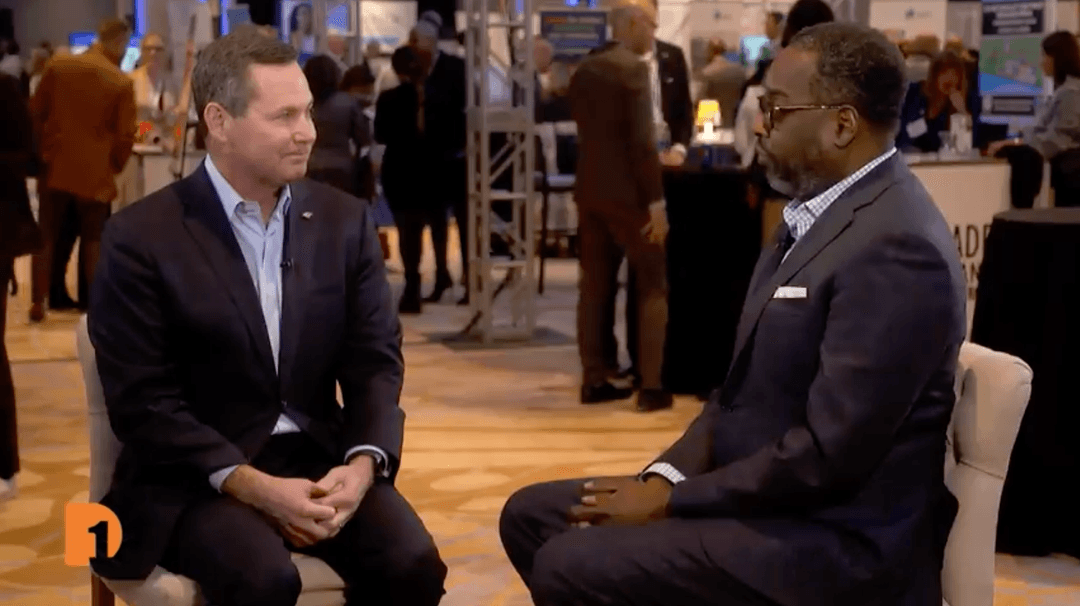Closing the wealth gap for Black-owned businesses. Can it be done in Detroit?
Jan 18, 2023
Less than 10% of the businesses downtown are Black-owned, and even less than that, 2% of the buildings downtown are Black-owned. In a city with a majority Black population, how did we get here? BridgeDetroit Engagement Director Orlando Bailey sits down with Metro-Detroit Black Business Alliance President and CEO Charity Dean, at the 2023 Detroit Policy Conference, to talk about how downtown Detroit can invest in and empower Black businesses.
They talk about the racial wealth gap that exists in downtown Detroit, Southeast Michigan and across the state, and the history of discriminatory laws and practices that paved the way for these disparities.
Plus, Dean shares how members of the Black Business Alliance must navigate a lack of access to capital and how corporate America can be part of the solution. She talks about reparations for descendants of Detroit’s Black Bottom neighborhood, the origins of the Metro-Detroit Black Business Alliance, and the policy changes the alliance is advocating for in 2023.
Full Transcript:
Orlando Bailey, BridgeDetroit: All right. So we are live here at the Detroit Regional Chambers Detroit Policy Conference. I’m so happy to be sitting with Charity Dean, the founder, and CEO of the Metro Detroit Black Business Alliance. How are you today?
Charity Dean, CEO, Metro Detroit Black Business Alliance: I’m great, Orlando. Thank you for having me. I’m very excited to be here at the Policy Conference and here talking with you.
Orlando Bailey: It’s always fun talking to you. We always have a great time. So you’re giving a policy perspective, a power perspective today at the policy conference, on empowering Black-owned businesses. Can you preview what that’s going to look like for us?
Charity Dean: So I’m going to talk about where downtown is now, right? We talk about where we’ve been ten years ago. We emerged into bankruptcy, right? The largest city in the United States in municipal bankruptcy. And look at where we are today.
We have a tendency, a pattern, of actually doing what I think people might say is impossible. And so because of that, what I’m going to do is challenge the audience to continue to do the impossible. I’m going to call out the racial wealth gap that exists in our country, in our state, in our city, in downtown Detroit. Less than 10% of the businesses downtown are Black-owned and less than 2% of the buildings are Black-owned downtown in a city that is over 75% Black.
Orlando Bailey: How do we get there? How does that happen in a city that is over 75% Black?
Charity Dean: Sorry. That’s a real question. How do we get there? This story is not unique to Detroit. In fact, we probably have more Black-owned businesses in downtown Detroit than maybe a downtown Chicago or downtown New York. Manhattan, right? But the story is the same. It is in every major city across the country. And it started when enslaved Africans were brought to this country.
And then you had decades and generations of discrimination and legal prohibition of Black people to acquire land. It was literally illegal. The federal government prohibited Black people from buying land and accessing land. You had restrictive covenants and deeds.
My great-grandmother, Rosa Malone, integrated a neighborhood in Detroit in 1973 and was the second Black family in 1973. How many generations of wealth have we missed? When talking about the wealth gap, we talk about capital and land. We didn’t get the Fair Housing Act until 1968. That’s when redlining was prohibited. So how did we get here? Oh, I mean, we got here very intentionally.
Orlando Bailey: I want to talk about this capital gap that you were talking about and this wealth gap. And it’s less overt now. Banks love the word risk. And we know that risk sort of has a color. What are you seeing? What are your members seeing?
Charity Dean: What we’re seeing is that Black businesses still do not have access to capital. And I think risk is subjective. Risk has always been subjective. Credit has always been subjective. We hear stories time and time again of our members that are trying to acquire property for development deals. For some folks, the risk is more than the other folks, and the only difference is the color of their skin.
And until we have real transformative reform at the federal level, we’re always going to be behind. What we’re trying to do with the Metro Detroit Black Business Alliance is do what we can within our limited power. But at the end of the day, the problem of racism and the problem of the racial wealth gap should not be on the burdens of Black people.
How do we get ourselves out of the tunnel that we did not put ourselves in? And until that United States government and until corporate America identifies this as a problem for them to solve, we’re going to continue to be putting Band-Aids on it. We’ve got the best Band-Aids possible. But we’ve got to advocate for policies, and we need real policy change in order to help close that wealth gap.
Orlando Bailey: Well, it’s a tall order. And here at the Policy Conference, you have the corporate community, you have the government community, the philanthropic community, all of these folks who have their hands on the levers of power that can change some of the systems of inequities that you are highlighting. How are you feeling about laying there?
Charity Dean: I want to sit on this stage. I’m going to stand on the stage, and I am going to talk about Black Bottom and I’m going to talk about the removal of Black businesses in a neighborhood. And then I’m going to ask the corporate community to find those descendants of those Black businesses and give them land. I’m going to say that today.
Orlando Bailey: Wow. Because it’s already happening, this development.
Charity Dean: Here’s the thing. Detroiters do things that other people don’t do. We hustle hard. We do the impossible. We have emerged from bankruptcy in a way that no one ever imagined. Why can’t we close the wealth gap? Why can’t we be first? Why can’t we be a model for the nation to say they did it in Detroit and they did it in downtown Detroit? Look at what happened to Black Bottom and look how they were able to solve that problem. So it’s up to us.
Orlando Bailey: The other interesting thing that the Metro Detroit Black Business Alliance is doing is really shaking and moving in this policy advocacy space in a way that I haven’t seen a Black Business Alliance here in the city do in a really long time. You’re at the city council table, you’re in Lansing, and you’re putting that law degree to work. Tell me about why that’s important toward the advancement of black-owned businesses here in the city.
Charity Dean: When we first started The Black Business Alliance, we said our mission was to create programs and advocate for policies. It’s been in our mission statement from the very beginning. Why is that important? Because you cannot make change without policy.
We can do our Capital Connect program and train people, but if the rules that exist remain the same, then we’re spinning a wheel. And so we’ve got to create policy change. We have to make sure that the people at the state, local, and federal levels are thinking about Black-owned businesses when they’re making decisions. They have to understand the racial wealth gap when they’re making decisions. They have to understand how we got here when they’re making decisions. And they won’t do it if they don’t know we’re here.
So we are very engaged. You will see. We’re going to roll out a 2023 policy agenda for Black-owned businesses. We view Black businesses as one of the ways to help close that racial wealth gap. And it’s not just us. Goldman Sachs put out a report saying the same thing. The Kellogg Foundation put out a report saying the same thing. So if we know this, where’s the urgency? We’re going to bring it.
Orlando Bailey: Yeah. So give me a little bit of the origin story. So we’ve got about 2 minutes left of the Metro Detroit Black Business Alliance. I mean, you were a lawyer and a city employee. How does one go from being an attorney and a city employee to launching really one of the largest Black business alliances we’ve seen in a very long time?
Charity Dean: I was created to solve problems. That’s it. When I was in the city of Detroit, I was the director of civil rights and I found myself doing a lot of work on behalf of Black businesses and not one person, not another organization to partner with. There were other organizations we would reach out to, but no one was really doing the work. And so I thought, well, this doesn’t make sense. We’re convening Black businesses, but I’m convening them on behalf of the city, and I’m not helping them convene on their own.
And so I got with a group of other Black business owners, and we said, we want to do this. We need to create a space. Black businesses are the lifeblood of the city of Detroit. They bring jobs, they hire Detroiters, and they revitalize commercial corridors. They need a voice, and they need a loud one. I’m kind of loud.
Orlando Bailey: Charity Dean, it is always a pleasure having the opportunity to sit and talk with you. Thank you for coming on.
Charity Dean: Thank you, Orlando.
Stay Connected:
Subscribe to Detroit PBS YouTube Channel & Don’t miss American Black Journal on Tuesday at 7:30 p.m and Sunday at 9:30 a.m. on Detroit PBS, WTVS-Channel 56.
Catch the daily conversations on our website, Facebook, Twitter and Instagram @amblackjournal.
View Past Episodes >
Watch American Black Journal on Tuesday at 7:30 p.m. and Sunday at 9:30 a.m. on Detroit Public TV, WTVS-Channel 56.
Stay Connected
Subscribe to Detroit PBS YouTube Channel & Don’t miss American Black Journal on Tuesday at 7:30 p.m. and Sunday at 9:30 a.m. on Detroit PBS, WTVS-Channel 56.
Catch the daily conversations on our website, Facebook, Twitter, and Instagram @amblackjournal.
Related Posts
Leave a Reply
Your email address will not be published. Required fields are marked*




























